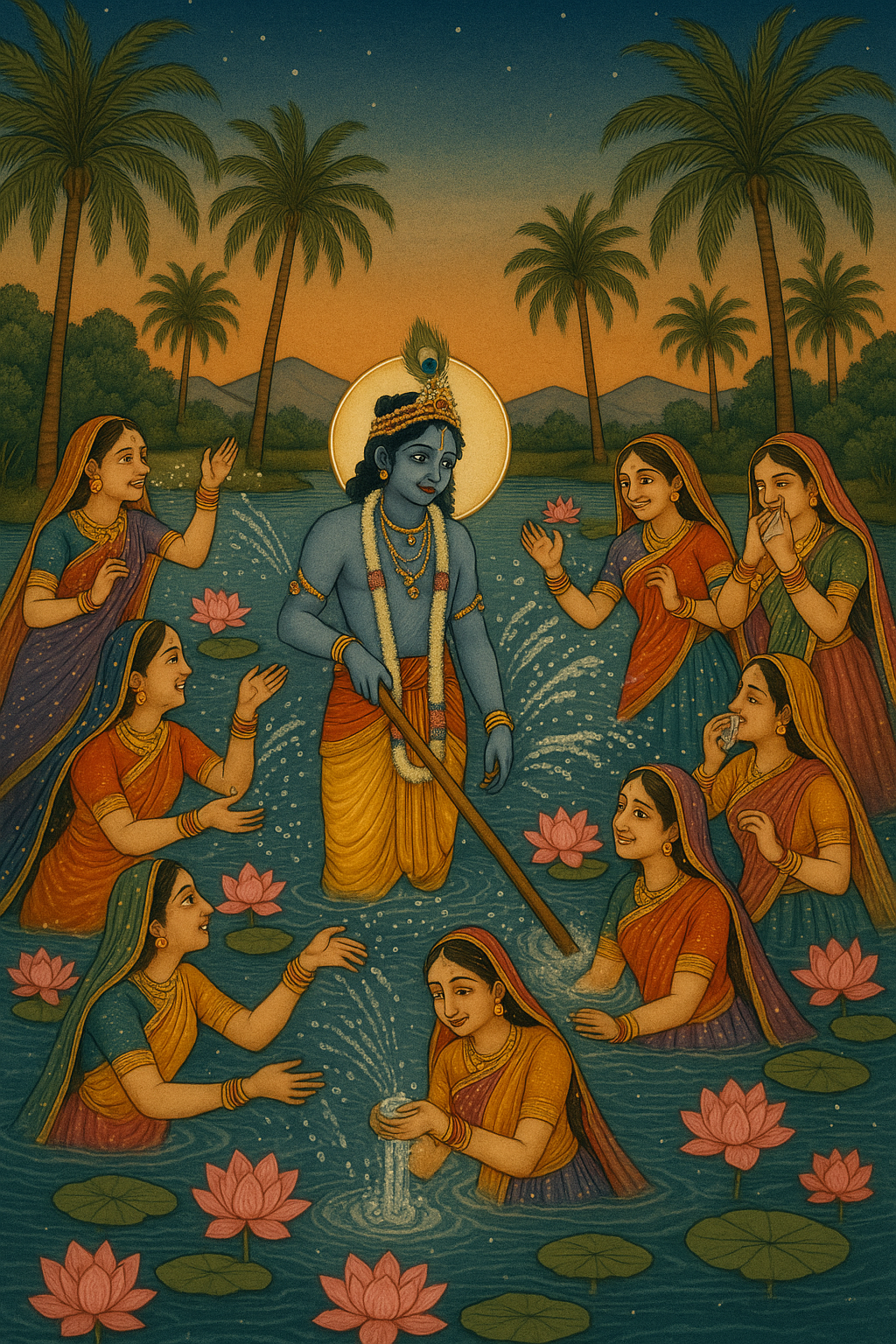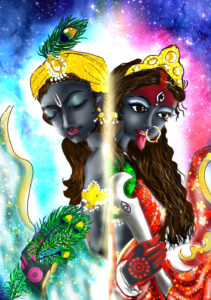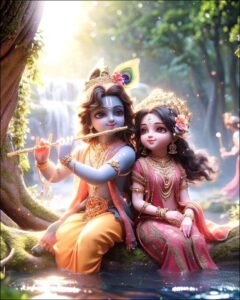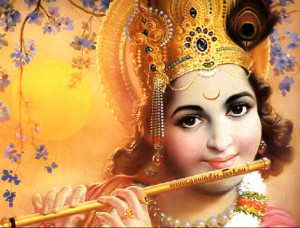The Divine Water Pastimes in Tālavana
News of Heroism in Tālavana
After the fierce demon Dhenukāsura was slain by the powerful arms of Śrī Balarāma, the cowherd boys of Vraja returned joyfully from Tālavana, the forest of tāla trees. With great excitement, they narrated to the elders and their families the astonishing pastime—how Kṛṣṇa and Balarāma had tossed the demoniac donkey-demons into the trees, thus freeing the forest and allowing the sweet tāla fruits to be enjoyed again.
The Gopīs’ Desire Awakens
Among those who heard the boys’ narration were several young gopīs. Their hearts were already captivated by Śrī Kṛṣṇa’s beauty and heroism, but now a new desire bloomed within them—to behold the sacred Tālavana where their beloved had performed such a wondrous feat. They longed to see the very trees where the demon bodies had been thrown and to walk in the forest sanctified by Kṛṣṇa’s lotus feet.
Kṛṣṇa Fulfills the Gopīs’ Desire
Knowing the innermost desires of His beloved gopīs, Kṛṣṇa, the supreme controller of all, decided to grant them this cherished wish. One day, after enjoying rasa-vihāra (a loving dance) with them at Candra-sarovar, Kṛṣṇa lovingly took their delicate hands and led them into the depths of Tālavana. There, He pointed to the towering palm trees and said with a smile, “Here My elder brother Balarāma threw the demon Dhenuka. And here, see—this is where I tossed his wicked associates!”
Rasa Dance and Perspiring Bliss
Overwhelmed with joy, the gopīs requested Kṛṣṇa to dance again in celebration. Kṛṣṇa, the master of all arts, began to dance, and the gopīs followed with divine rhythm. Their anklets jingled, their laughter rang like bells, and their hearts beat in perfect sync with His steps. They danced so vigorously that their foreheads began to glisten with droplets of divine perspiration. Immersed in bliss, time itself stood still.
A Plea for Water
At the end of the rāsa dance, the gopīs, now thirsty and flushed, gathered around Śrī Kṛṣṇa. With playful complaints and loving glances, they said, “O protector of Vraja! This dance has made us so thirsty, but Yamunā-devī is far away. How can we continue without water? Please, do something!”
The Birth of Vetra Gaṅgā
Hearing their plea, Kṛṣṇa smiled gently and, taking His vetra (cowherd stick), struck the earth with it. Immediately, the ground opened up and a crystalline lake of sacred water emerged—filled with fragrant blue lotuses. This was no ordinary water; it was Gaṅgā herself, manifesting from the touch of the Lord’s staff. The gopīs joyfully drank the cool, sweet water, their thirst quenched and hearts satisfied.
Jalakeli in Vetra Gaṅgā
On Kṛṣṇa’s invitation, the gopīs entered the newly formed lake, and there, amidst blossoming lotuses and gentle ripples, they performed jalakeli—playful water pastimes with their beloved. They splashed water upon Kṛṣṇa, and He responded with joyful laughter, enchanting the entire forest with His divine charm. The trees swayed, birds sang, and the air was thick with prema-rasa.
Evening Picnic Under the Stars
As the sun set and the stars adorned the evening sky, the gopīs and Kṛṣṇa sat together beneath the tall palm trees of Tālavana. There, they shared a divine picnic, relishing the juicy tāla fruits. As the gopīs savored the sweet nectar of the fruit, Kṛṣṇa narrated thrilling tales of how He rid Vṛndāvana of various demons—each story further deepening the gopīs’ love and reverence for Him.
The Glories of Vetra Gaṅgā
This sacred lake came to be known as Vetra Gaṅgā, named after the vetra (staff) of Kṛṣṇa by which Gaṅgā-devī manifested. It is said that this tīrtha is so purifying that simply by touching its waters, one becomes free from the terrible sin of brahma-hatyā—the killing of a brāhmaṇa. And one who bathes in its sacred waters becomes qualified to enter Goloka Vṛndāvana, the supreme spiritual abode of love.
Śrī Caitanya Mahāprabhu’s Visit
During His divine pilgrimage through Vraja-maṇḍala, Śrī Caitanya Mahāprabhu, the golden avatāra of love, came to Tālavana. There, He offered worship to Lord Balarāma, the slayer of Dhenukāsura, and bathed in Vetra Gaṅgā, absorbed in remembrance of these transcendental pastimes. Tears flowed from His eyes as He tasted the same nectar of love shared by the gopīs and Kṛṣṇa.
Lesson to Be Learned
The līlā of Vetra Gaṅgā teaches us that Kṛṣṇa knows the hearts of His devotees and fulfills their pure desires in extraordinary ways. Even a desire as simple as tasting sweet water or walking in a forest becomes the stage for eternal loving exchanges. Moreover, the appearance of sacred Vetra Gaṅgā reminds us that even the Lord’s staff carries the power to manifest the Gaṅgā, proving how potent and divine all aspects of the Lord are. Let us approach such holy places not as tourists but as humble pilgrims, longing to bathe not only in the waters but in the rasa of pure devotional service.
Origin of the Story:
Narrated by Indradyumna Swami partially referenced in Vraja-maṇḍala Parikramā and Bhakti-ratnākara.



